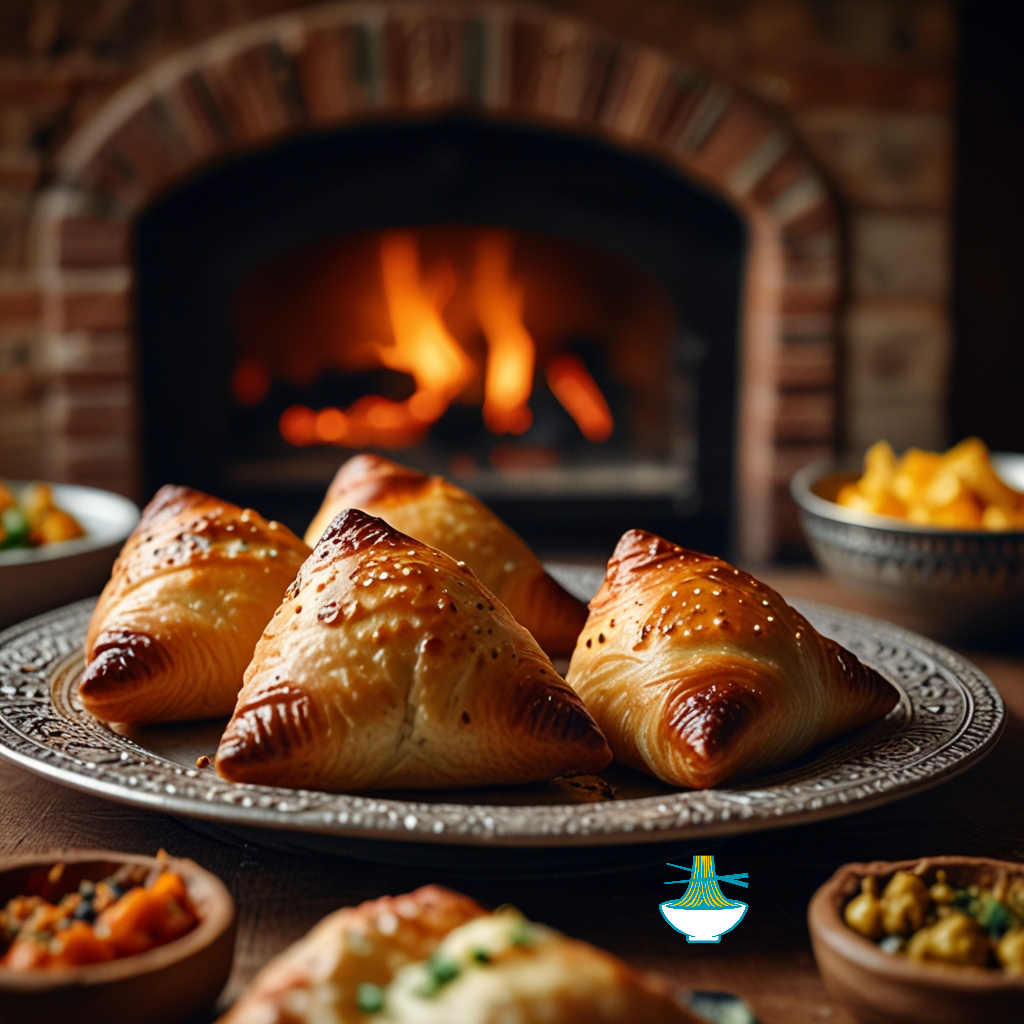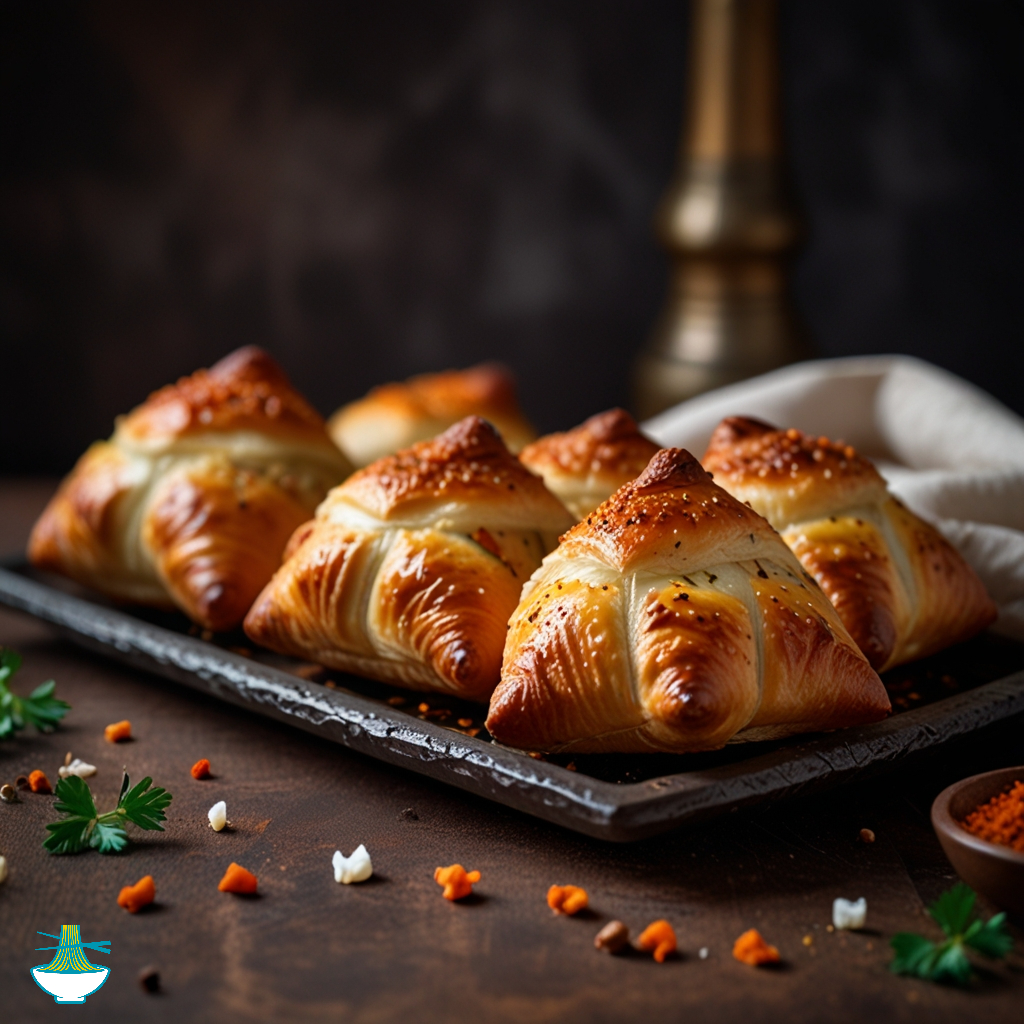Samsa is a traditional Central Asian savory pastry that delights with its flaky layers and flavorful filling. Originating in the ancient Silk Road region, samsa has a rich history dating back centuries, with variations found in Uzbek, Tajik, Kyrgyz, and other cuisines. 
The recipe typically involves a dough made from flour, water, and sometimes butter or oil, rolled thinly and layered to create a crisp texture when baked. The filling is a savory blend of minced lamb (though beef or other meats can be used), finely chopped onions, aromatic spices like cumin, coriander, and sometimes garlic. These ingredients are carefully combined and sealed within the dough, then baked until golden brown and fragrant.
Samsa is often enjoyed as a snack or appetizer, served warm and accompanied by yogurt or a tangy dipping sauce. Its popularity has spread beyond Central Asia, becoming a beloved treat appreciated for its delicious combination of meaty goodness and buttery, flaky pastry.
For clear and uncomplicated ingredients and method, here's a simplified version:
Ingredients:
- 1 lb minced lamb (or beef)
- 1 onion, finely chopped
- 1 tsp ground cumin
- 1 tsp ground coriander
- Salt and pepper to taste
- Store-bought puff pastry sheets (for convenience)
Method:
1. Preheat your oven to 375°F (190°C).
2. In a bowl, mix minced lamb, chopped onion, cumin, coriander, salt, and pepper.
3. Roll out the puff pastry sheets and cut into squares or rectangles.
4. Place a spoonful of the meat mixture onto each pastry piece.
5. Fold the pastry over the filling to form triangles or rectangles, sealing the edges with a fork.
6. Place the samsa on a baking sheet lined with parchment paper.
7. Bake for about 20-25 minutes or until golden brown and cooked through.
8. Serve warm as a delightful snack or appetizer.
This recipe keeps things straightforward while still delivering the delicious flavors of traditional samsa.
Nutrition Value:
1. 1 lb minced lamb (or beef):
- Calories: Approximately 1200-1300 calories
- Carbohydrates: Negligible
- Protein: Approximately 90-100 grams
- Fat: Approximately 90-100 grams
- Sodium: Varies depending on processing and added salts
- Cholesterol: Varies, but generally higher due to animal fat content
- Nutritional benefit: Rich in protein, iron, zinc, and B vitamins (such as B12 and niacin). However, it also contains saturated fats, so it should be consumed in moderation.
2. 1 onion, finely chopped:
- Calories: Approximately 40-60 calories
- Carbohydrates: Approximately 10-15 grams
- Protein: Negligible
- Fat: Negligible
- Sodium: Approximately 5-10 mg
- Cholesterol: Negligible
- Nutritional benefit: Onions are a good source of fiber, vitamin C, vitamin B6, and various antioxidants. They also add flavor and texture to dishes.
3. 1 tsp ground cumin:
- Calories: Approximately 8-10 calories
- Carbohydrates: Approximately 1-2 grams
- Protein: Approximately 0.5-1 gram
- Fat: Approximately 0.5-1 gram
- Sodium: Approximately 1-2 mg
- Cholesterol: Negligible
- Nutritional benefit: Cumin is rich in antioxidants and may have anti-inflammatory properties. It also contains small amounts of iron and may aid digestion.
4. 1 tsp ground coriander:
- Calories: Approximately 5-8 calories
- Carbohydrates: Approximately 1 gram
- Protein: Negligible
- Fat: Negligible
- Sodium: Negligible
- Cholesterol: Negligible
- Nutritional benefit: Coriander is a good source of vitamin C, vitamin K, and small amounts of minerals like calcium and manganese. It also adds flavor to dishes.
5. Salt and pepper to taste:
- Calories: Negligible
- Carbohydrates: Negligible
- Protein: Negligible
- Fat: Negligible
- Sodium: Varies depending on amount added
- Cholesterol: Negligible
- Nutritional benefit: While salt is necessary for the body in small amounts, excessive consumption can lead to health issues like high blood pressure. Pepper contains small amounts of vitamins and minerals and may have antioxidant properties.
6. Store-bought puff pastry sheets (for convenience):
- Calories: Varies depending on brand and serving size, typically around 100-150 calories per sheet
- Carbohydrates: Varies, typically around 10-15 grams per sheet
- Protein: Varies, typically around 1-2 grams per sheet
- Fat: Varies, typically around 6-10 grams per sheet
- Sodium: Varies depending on brand and processing
- Cholesterol: Varies depending on brand and ingredients
- Nutritional benefit: Puff pastry is high in calories and fats, mainly from butter or vegetable shortening. It's a source of energy but should be consumed in moderation due to its high calorie and fat content.


Comments